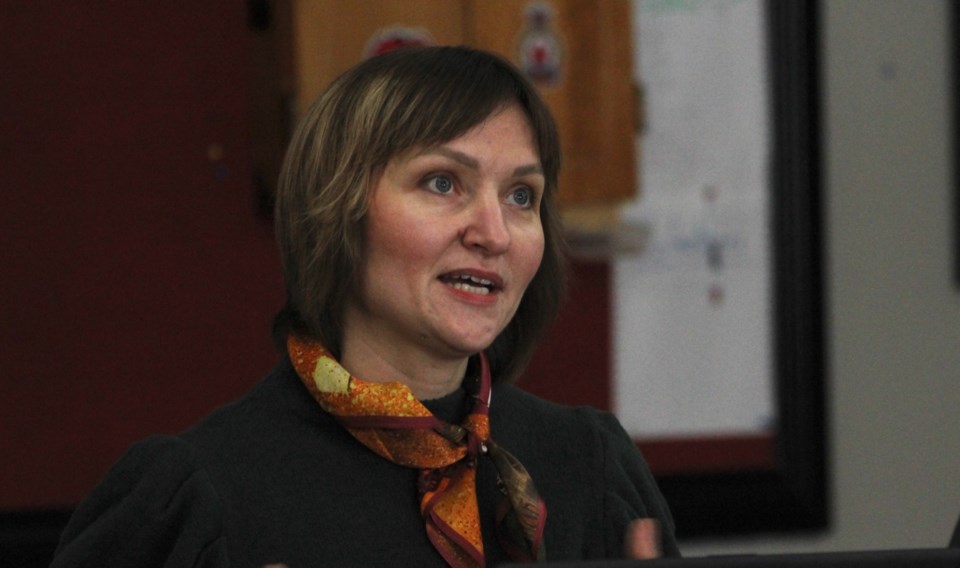ATHABASCA – Since the February 2022, invasion of Ukraine, 958,190 men, women, and children have come to Canada through the Canada-Ukraine authorization for emergency travel, as of Feb. 2, 2024. One Athabasca County couple has had a little more experience with the process then most.
Harold and Brenda Krawec have helped multiple families settle within the county, starting with some extended family members in early 2022.
“We just started filling in paperwork, there were lots of forms,” said Harold. “There’s so much paperwork, it’s just awful.”
The Krawecs are both born and raised in Athabasca, and they can both trace their family roots back to Ukraine. Harold grew up speaking Ukrainian — he didn’t speak a word of English until school — but had lost the language until he had a reason to use it again. When an extended family member reached out for help leaving Lutsk, a city in northwest Ukraine, soon after the invasion, that opportunity arrived.
“We’re sort of their English sounding board, like if they need help with something Harold can help translate,” said Brenda.
The families the Krawecs helped came over with little more than a suitcase, so getting set up in Canada required resources. Brenda estimated the pair had helped find enough furniture to equip three households over the last two years.
“The community has made the process easier, once people realized we had people here, they started phoning asking, ‘Do you need this or do you need that?’ and it makes it easier,” said Brenda. “It becomes a community effort.”
Brenda said the couple soon had an entire network of county families that were also sponsoring refugees, so even if they didn’t need an offered item there was a good chance they knew someone who did.
While the Krawecs and other families like them have been helping Ukrainian refugees settle in Canada, other county residents are taking a more hands on approach with their contributions.
Pat Shaffer, a pharmacy technician with a knack for understatement, has been helping fundraise and transport supplies to Ukraine since late 2022. In advance of her third trip to the country, Shaffer presented to the Athabasca Rotary Club to ask for help.
“When Russia first invaded, I heard about it and didn’t honestly think there was anything I could do,” said Shaffer. “In November (2022) I happened to be looking on Facebook and I saw that this man was making his thirteenth trip to Ukraine to bring over supplies.”
Shaffer got started by donating money for excess baggage — Air Canada was charging $225 for every bag after this tenth according to Shaffer — and the man was bringing over 26 hockey bags worth of supplies.
The initial donation quickly turned into more. Shaffer stayed in touch with the man and progressed from helping him transport supplies for the military to doing it herself. She said she was planning on going again in April, this time with two goals in mind: bring tablets to schools in the region of Sumy, in northeast Ukraine, and get medical aid for the hospitals in Putyval, a city in Sumy.
“I’m just doing the next application to try and get some more of the medications, last time it was $1,730 for the medications,” estimated Shaffer. “I got about $30,000 worth of medication for that, and both hospitals have said they’ve gone through it already.”
Shaffer’s familiarity with medications came in handy during her trips. While she initially got started bringing over supplies for the military, her healthcare background allowed her to help in other ways. Most medications she brought over are for chronic conditions, like high blood pressure — “I don’t know why anyone in Ukraine would need blood pressure medication, it’s not like they’re under stress or anything,” said Shaffer — but with the help of a registered nurse from Edmonton, Shaffer was able to bring over additional medical supplies to help the hospitals.
“She would come across something and I would know what it was for, and I would come across something and she would say, ‘Oh that would be very good in a hospital,” said Shaffer. “Something as simple as a tube of Polysporin, as ridiculous as that sounds, if you’re on the front line and you scrape your hand on something or you’re working with a hot mortar shell, it’s easy to get an infection just because you can’t keep clean.”
The Rotary Club of Athabasca has a full case load already, but that hasn’t stopped one club members from stepping up on their own to help Shaffer. Alex Kondra, a Rotary member and Athabasca resident, has been working to connect anyone working on Ukrainian relief efforts, including Shaffer, to the Rotary Club of Athabasca.
“They have a concrete project around children’s education in Ukraine, and that’s a primary focus for our club, that’s where we tend to spend our money,” said Kondra.
Shaffer’s school project would see Ukrainian schools in Sumy equipped with tablets to help students learn outside the building. Schools can only teach as many kids as they have bomb shelter space for, so classes in smaller schools are moving to a part-time method, where kids may only be in the classroom every other day.
“One request (they’ve) had has been computer tablets for the kids,” said Shaffer. “When they’re not going to school they’re supposed to keep up their work on their computer, but some of these families just don’t have a computer.”



